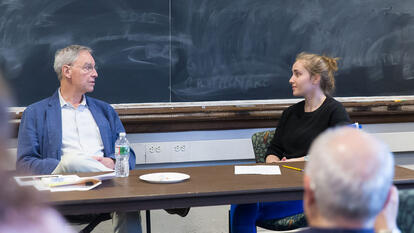
Wellesley Professor Explains Why It’s Time to Address the Limitations of Current Anti-Trafficking Efforts
Twenty years ago, the United Nations established a protocol to address human trafficking and the United States passed the Victims of Trafficking and Violence Protection Act of 2000 (TVPA). Jennifer Musto, associate professor of women’s and gender studies at Wellesley, researches efforts designed to combat human trafficking, and she considers this a critical time to reflect on the success of those actions as well as reconsider both the structural vulnerabilities that enable exploitative labor arrangements and how to best support victims.
“The protocol and U.S. legislation have proven limited,” Musto said. Though U.S. anti-trafficking laws are framed as victim-centered, she explained, anti-trafficking efforts can actually end up harming the people they aim to help. “So much more needs to be done to meaningfully assist people in exploitative labor situations and to prevent trafficking and labor exploitation more broadly,” she said.
Part of the problem with how trafficking is addressed today stems from it being seen originally as a law enforcement issue, not a human rights issue, Musto said. “That tension recurs over and over again,” she said. “Anti-trafficking efforts are closely tied to the criminal-legal system in the United States and privilege law enforcement approaches, for instance the use of arrests and prosecution. In the last decade, the effects and limits of carceral approaches to trafficking have come into clearer focus.” In her recent book, Control and Protest, Musto writes about the punitive dimensions of anti-trafficking efforts and looks at how partnerships among law enforcement, advocacy, and social services groups that were created to fight domestic sex trafficking have blurred the boundaries between punishment and protection, victim and offender, and state and nonstate authority.
“So much more needs to be done to meaningfully assist people in exploitative labor situations and to prevent trafficking and labor exploitation more broadly.”
Jennifer Musto
In her research, Musto also explores the role of technology and data in anti-trafficking efforts. As the keynote speaker at a conference at the Diplomatic Academy of Vienna in October 2019, Musto said that a growing number of anti-trafficking stakeholders understand the importance of using algorithms, machine learning, and dark web search tools to stop traffickers who use technology to exploit people, though she cautioned that anti-trafficking efforts augmented by technology are not as straightforward as some advocates believe.
Musto further explored the links between anti-trafficking and technology in the April 2020 special issue of the Anti-Trafficking Review, of which she was a guest editor. In their editorial, Musto and her co-authors discuss the nuances that must be considered when combating human trafficking, particularly in the midst of a global pandemic. They ask, “Might an already constrained economic situation worsen for people in the sex trade as well as for workers in the gig economy, manufacturing, or service industries such as tourism and hospitality? How might technology exacerbate already precarious labour arrangements? And what analytical insights from past research to document anti-trafficking and technology might be brought to bear in mitigating current and future vulnerabilities?”
These questions reflect the ways anti-trafficking measures have caused more problems than they’ve solved, and they connect Musto’s past and ongoing research and her aim to understand whether current anti-trafficking efforts support or limit marginalized groups’ access to justice.
“Justice for many survivors of sex trafficking in the United States remains elusive at best and cruelly retributive at worst,” Musto said. While her research has illuminated what hasn't worked, she is optimistic that understanding the limits of current efforts will influence future efforts: “We must ask: How do we meaningfully and sustainably support people who have experienced exploitative labor situations? How do we ensure that their rights are protected and their access to protection is untethered to the criminal-legal system? How do we meaningfully address prevention and the structural inequalities that shape exploitative labor arrangements?” Promisingly, she noted, “a growing number of anti-trafficking stakeholders acknowledge that treating trafficked persons as criminals, not victims, is antithetical to the goals of anti-trafficking as defined by the TVPA.”
Right now, Musto is looking at the impact of COVID-19, protests against structural racism, and economic precarity in the United States on anti-trafficking activities. Despite the myriad challenges facing people in trafficking situations as well as frontline advocates and activists, Musto said she has seen a heightened willingness to explore alternatives to current approaches, and she hopes her findings will inform future policy.
“A key idea in this research is accountability,” she said. “What does accountability look like in anti-trafficking?” For Musto, accountability means addressing how current policies and practices exacerbate harms and disproportionately impact marginalized groups. These questions have always been critical, she said, but “they are especially important to explore now as the United States faces overlapping crises.”



